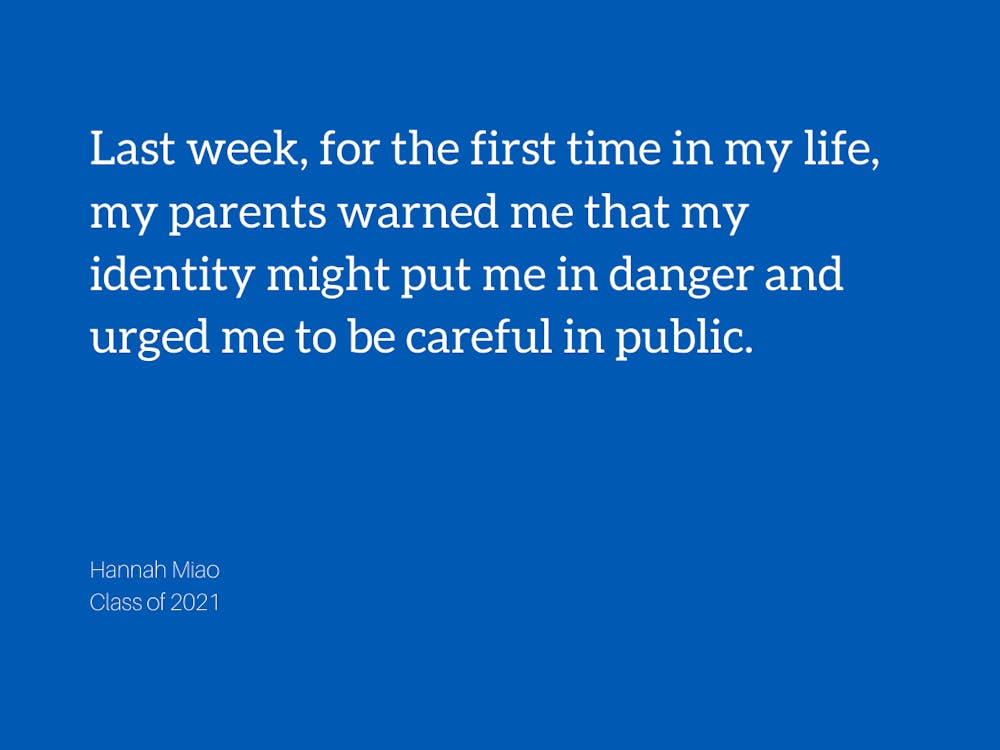Last week, for the first time in my life, my parents warned me that my identity might put me in danger and urged me to be careful in public. “A lot of people are going to hate Chinese people,” my father said. I was terrified to leave my house to pick up a prescription from the pharmacy or go for a run in a nearby park.
Until now, I have experienced relative privilege as a person of color in that the shape of my eyes and the shade of my skin and the color of my hair have not elicited the same kind of surveillance endured by many Black, brown and Muslim Americans. As an American of Chinese descent, I have faced plenty of discimination, yet my perceived Otherness has rarely placed me in immediate harm.
But the ripping effects of COVID-19 have revealed to me that the way I look could inspire a visceral, violent hatred from my fellow Americans. Since the outbreak of COVID-19, xenophobia and bias against Chinese Americans and others who are perceived to be Chinese have grown at an alarming rate. Reports of verbal assaults and physical attacks against Asians and Asian Americans multiply every day.
On Tuesday, President Price sent a statement to the Duke community addressing the increased incidents of bias and hatred against Chinese and Asian individuals in the United States. He wrote, “Duke has benefitted from a vibrant relationship with China...Over the decades, thousands of Chinese and Chinese-American students, faculty, staff, and visitors have come to our campus to study, work, conduct research, and treat patients.”
Besides his concerning implication that Chinese and Chinese American individuals exist exclusively in the spheres of research and medicine, President Price’s statement reveals a more consequential subtext. In previous emails sent after acts of hatred, the President had never qualified the targeted community by their ability to contribute productively to Duke. His message is clear: Asians and Asian Americans are worthy of dignity because of the tangible value we are expected to bring, rather than our inherent humanity.
President Price’s message reflects a broader construction of Asian Americans as the “model minority.” Not only does this framing pit Asian Americans against other racial and ethnic minorities, it places us in a precarious state that makes our humanity provisional. If we do not meet the expectations of an “exceptional,” “good” minority, are we still worthy of the same respect? The “model minority” framing is exactly what has paved way for the current wave of racial discrimination as our Asian-ness is now perceived as a threat.
Just like it will take collective action to defeat this pandemic, healing these racial scars will also require solidarity and mutual care. Non-Asian Americans have a responsibility to speak up against unjust treatment of Asian Americans, and I hope this serves as a reminder for Asian Americans to stand in alliance with other marginalized communities long after this virus has been defeated.
For now, I often feel hopeless and helpless in the face of such overwhelming uncertainty, of the devastating effects caused by COVID-19 and the potential for hatred that it has revealed. In these moments, I look inward for a reminder of who I know myself to be.
I am not a virus and I am not your model minority.
Hannah Miao is a Trinity junior. To report incidents of anti-Asian discrimination, visit Stop AAPI Hate.
Get The Chronicle straight to your inbox
Signup for our weekly newsletter. Cancel at any time.

